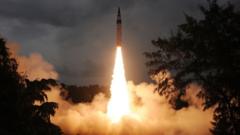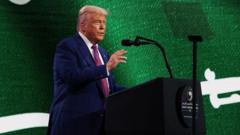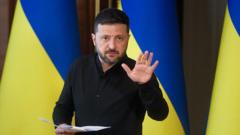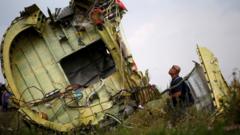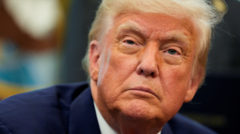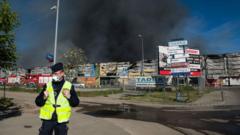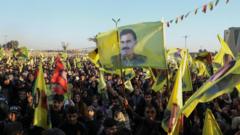Amidst escalating tensions in Ukraine, President Zelensky signals readiness to engage directly with Putin during an impending summit in Turkey, with the hope of brokering a ceasefire.
Zelensky Prepares for Crucial Talks with Putin as Tensions Rise
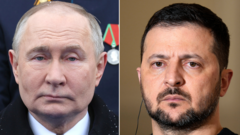
Zelensky Prepares for Crucial Talks with Putin as Tensions Rise
Ukrainian President Zelensky emphasizes urgency for peace discussions ahead of high-stakes meeting in Istanbul.
Ukrainian President Volodymyr Zelensky has confirmed his imminent travel to Ankara for discussions with President Recep Tayyip Erdogan, and expressed his openness to direct negotiations with Russian President Vladimir Putin in Istanbul scheduled for Thursday. At a rapid-fire briefing in Kyiv, Zelensky declared, "We will do everything to ensure that this meeting takes place," indicating a heightened urgency in the ongoing conflict.
While the Kremlin has yet to reveal the specifics of Putin’s travel plans, it asserted that an official announcement would be made when deemed appropriate. This upcoming meeting would mark the first face-to-face dialogue between the two leaders since they last convened in Paris in December 2019. The last direct talks between Ukraine and Russia occurred in Istanbul back in March 2022—shortly after the onset of Russia's extensive military engagement in Ukraine.
Originally, Putin had suggested he would engage in negotiations in Istanbul "without pre-conditions"; however, it was Zelensky who took the initiative to confirm his presence, anticipating that the Russian president would attend as well. A high-level delegation from the United States is also expected to attend the talks.
Zelensky's announcement aimed to place pressure on Russia to engage positively in the negotiations. Meanwhile, the Kremlin has dismissed calls for pressure on Moscow, reiterating that they do not respond favorably to ultimatums. Russian officials emphasize the desire for a comprehensive resolution addressing what they term the "root causes" of the conflict—conditions that Ukrainian leaders firmly reject.
As Zelensky expressed his willingness to meet with Putin in Istanbul, he emphasized the immediate priority of establishing a 30-day ceasefire—a consensus shared among Ukraine’s allies, including the United States. Despite a recent overture from Putin for direct talks, Zelensky expressed skepticism, alleging that it was an attempt to intimidate Kyiv into inaction.
U.S. President Donald Trump has hinted at the possibility of joining the summit should he perceive constructive outcomes; however, this remains speculative, with reports indicating plans for two senior U.S. envoys, Steve Witkoff and Keith Kellogg, to attend on meeting day.
The Kremlin has tried to quell speculation surrounding Putin’s attendance, stating, “Russia continues preparations for the negotiations due on Thursday. That’s all that can be said right now,” as per spokesperson Dmitry Peskov. In addition, Deputy Foreign Minister Sergei Ryabkov conveyed Russia's intent for responsible dialogues while noting the realities imposed by territorial claims stemming from the ongoing conflict.
Concerns about Ukraine’s compliance with agreements have been voiced by Russian officials, while EU foreign policy head Kaja Kallas opined that while a meeting would be beneficial, Putin’s willingness to attend remains questionable. Zelensky, for his part, accused Putin of avoiding the meeting, asserting that a refusal to partake in Istanbul would serve as a "final signal" of his reluctance to pursue peace.
Leaders from Ukraine’s key allies, including representatives from the UK, Germany, Poland, and France, visited Kyiv over the weekend, issuing warnings of looming sanctions should Russia decline to endorse a 30-day ceasefire. Furthermore, the EU is reportedly devising a 17th package of sanctions as the conflict continues to evolve.

